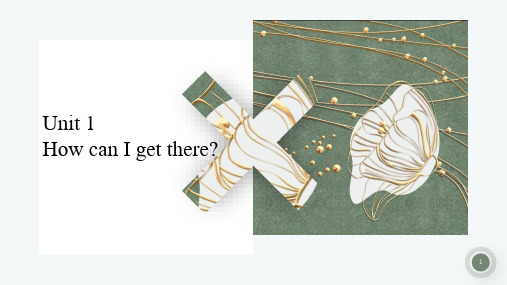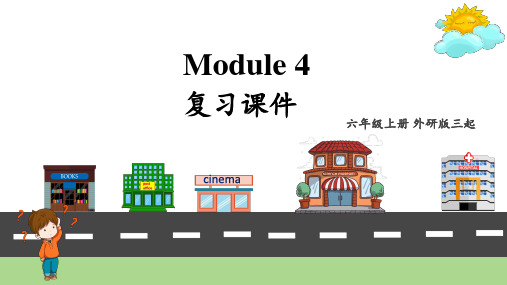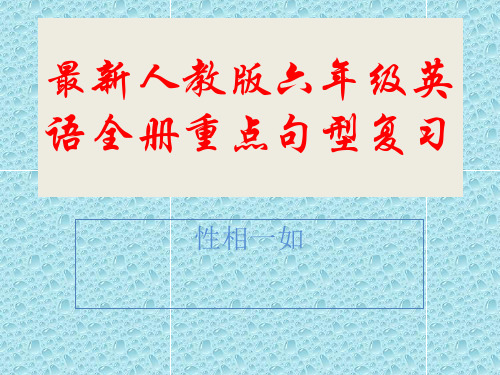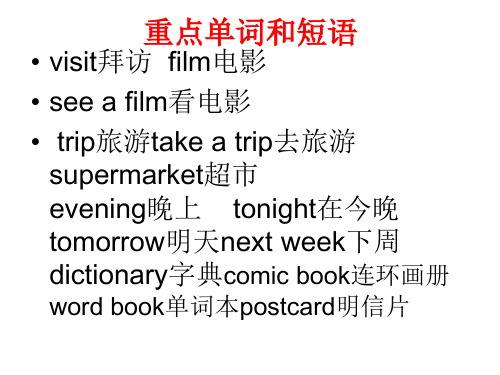2014年六年级英语上册句型期末复习课件
期末复习(讲义)译林版英语六年级上册

六年级上册期末复习一、时态复习1.一般现在时定义:经常发生的动作或现在的状态结构:主语+be/主语+动词注意:第三人称单数be动词用is,动词+s/es否定:主语+be+not 或主语+don't/doesn’t+doShe is=She’s He is=He’s I am=I’m We are=We’reis not=isn't are not=aren't am not不能缩写一般疑问句:①有be动词的情况下将be动词提前②动词用助动词do/does提问注意:改为一般疑问句时,第一人称要改为第二人称时间状语:never、seldom、sometimes、usually、often、always例:①My mother often goes shopping.→改为否定句:My mother often doesn't go shopping.→改为一般疑问句:Does your mother often go shopping?②I get up at 7 o'clock every day.→改为否定句:I don't get up at 7 o'clock every day.→改为一般疑问句:Do you get up at 7 o'clock every day?③Millie is a student.→改为否定句:Millie isn't a student.→改为一般疑问句:is Millie a student?2.现在进行时定义:现在正在做或正在发生的动作结构:is/am/are+doing否定:isn't/aren’t/am not+doing时间状语:Look!Listen!now、There be...over there、where is/are sb.?例:③Look!The girl is dancing.→改为否定句:Look!The girl isn’t dancing.②——Where’s mom, Dad?——Maybe she is cooking dinner in the kitchen.3.一般过去时定义:过去某个时间点发生的动作结构:主语+was/were 或主语+动词过去式否定:主语+was not/were not=主语+wasn't/weren’t 或主语+didn't+do 一般疑问句:①有be动词的情况下将be动词提前②动词用助动词did提问注意:改为一般疑问句时,第一人称要改为第二人称时间状语:yesterday、last...、just now、...ago例:③I was ill yesterday.→改为否定句:I wasn't ill yesterday.→改为一般疑问句:Were you ill yesterday?②He went to zoo with his parents last weekend.→改为否定句:He didn't go to zoo with his parents last weekend.→改为一般疑问句:Did he go to zoo with his parents last weekend?4.一般将来时定义:将来的计划或者打算结构:主语+is/am/are going to be或主语+is/am/are going to do否定:isn’t/aren’t/am not going to一般疑问句:be动词直接提前注意:改为一般疑问句时,第一人称要改为第二人称时间状语:next...、tomorrow例:①It is going to be Chinese New Year next week.→改为否定句:It isn’t going to be Chinese New Year next week.→改为一般疑问句:Is it going to be Chinese New Year next week?②I’m going to visit my grandparents tomorrow.→改为否定句:I’m not going to visit my grandparents tomorrow.→改为一般疑问句:Are you going to visit my grandparents tomorrow?二、易错点复习1.询问天气的两种句型:③what is/was the weather like?③How is/was the weather?2.There be句型③就近原则:be动词由后面的第一个名词决定③there be句型不能与have、has、had连用③there be +sb./sth.(即名词或代词)例:There is rain today.=It is rainy today.3.乘坐公共交通③take the/a bus to...=go to ...by bus=go to... on the bus4.home前面不加任何介词例:walk home drive home take a bus home5.will和shall的区别will表示将要,shall表示建议,shall一般用于疑问句表示提议,主语通常是we。
人教PEP版英语六年级上册Unit 1 - Unit 3 复习课件

3.特殊: go to+地点+ on foot walk to +地点
I go to school on foot. = I walk to school.
提出建议的句型: Let's +动词原形+其他
Let's go to the nature park. 我们去自然公园吧。 我们去学校吧。 Let's go to school.
Let's=Let us 的缩写 Let 让 us 我们 we的宾格形式
情态 1. 情态动词+动词原形 动词
2.情态动词没有人称和数的变化
11
on foot 步行
by bus 乘公交汽车
by ship 乘轮船
by taxi 乘出租车
by plane 乘飞机
by train 乘火车
by subway 乘地铁
1、
1.问句: How do you come to/go to+地点名词? 询问对方来某地的交通方式
答语: I come to/go to +地点+表达出行方式的介词短语
a e i o u 元音字母开头且发元音的单词 冠词要用an
have a good time!玩的开心!
have to do(动词原形) 不得不去做
他不得不去学校。
he has to go to school.
期末复习(课件)(一起)英语六年级上册

1. There _i_s_______(is, are) a Chinatown in New York. 2. There were _lo__t_s__o_f__(lots, lot) of people everywhere. 3. We ate in __a_n_______(a, an) American Chinese restaurant. 4. You __s_a__w____(see, saw) a lion dance in the street
4. I am going to ___r_e_a_d__( reads/ read) some books. 5.It ___is______(is/ were) very exciting.
2. There be 句型的用法:
1. There is+可数名词单数/ 不可数名词: eg. There is a desk in the room. 房间里有一张书桌。 There is some water in the cup. 杯子里有一些水。
6. 询问数量的多少:
结构:--How many + 名词复数+(are there) --There are +数量.
eg: --How many member states are there in the UN
--There are 193.
重点语法复习
1. 动词的一般过去式:
1.直接加-ed: play——played; visit——visited
特殊变化形式: go—— went are—— were speak—— spoke see—— saw
Module 4(复习课件)六年级英语上册(外研版三起)

A. Thanksgiving is my favorite festival. B. I like Thanksgiving.
Part 4
巩固提升
单项选择。
( )1. I like
.I can eat zongzi.
A. the Spring Festival B. Mid-Autumn Festival C. Flag Day
感恩节_____T__h_a_n_k_s_g_iv_i_n_g__D_a_y________ 升旗 _______f_ly__th_e__fl_a_g_______________ 唱歌 _______s_in_g__s_o_n_g_s_______________ 美国的节日_A_m__e_r_ic_a_n__fe_s_t_iv_a_l_s________ 我最喜爱的_m__y__fa_v_o_u_r_i_te__fe_s_t_iv_a_l_______ 月饼_______m__o_o_n__c_a_k_e_______________ 一次大型家庭聚会 __a_b_i_g_f_a_m__il_y_d_i_n_n_e_r__
( ) 7. Gansu is the west of China .
A. on
B.in
C. of
( ) 8. I'm sending an email my family in China .
A.to
B .on
C.in
单项选择。
( ) 9. Is there a letter me ?
①用于回答问题:What do you do on+节日名称? ②因为谈论每年的固定活动注意运用一般现在时和第三人称单数 At the Mid-Autumn Festival, my mother makes delicious moon cakes. 在中秋节,我妈妈做美味的月饼。 My father sings songs about the moon. 我爸爸唱关于月亮的歌。
同步高效课堂系列六年级英语上册(人教版PEP版)Unit4Ihaveapenpal复习课件

知识点03:-What are you doing?
-I’m writing an email to my new pen pal in Australia. 【语法解析】 1.此句型是现在进行时。表示正在进行的动作。 2.现在进行时的结构:be+doing。 3.现在进行时经常与时间状语now连用,有时候也与look,listen等 动词连用。
Unit 4 I have a pen pal 复习课件
Content
1 知识网络 2 知识梳理 3 精讲精练 4 巩固提升
Part 1 知识网络
pen pal, hobby, jasmine, idea, Canberra, amazing, shall, goal, join, club, share
牛刀小试
将下列动词变成-ing情势
1.sing__s__in__g_i_n__g_____ 2.play__p_l_a_y__in__g________ 3.run___r_u__n_n__in__g_____ 4.make__m__a_k__in__g________ 5.read___r_e_a_d__i_n_g_____ 6.live___l_iv__i_n_g___________ 7.swim_s_w__i_m__m__i_n_g____ 8.lie_____ly__in__g__________
Part 4 巩固提升
英汉互译
1.singing__唱_歌___________________ 2.dancing__跳__舞_________________ 3.去远足__g_oe_s__h_ik_in_g_____________ 4.踢足球___p_la_y_in_g_f_o_o_t_ab_a_l_l _______ 5.练工夫_d_o_in_g_k_u_n_g_f_u____________ 6.cook Chinese food___做_中__餐_______ 7.study Chinese___学__习_中__文________ 8.do word puzzles___猜__字_谜_________
人教版PEP六年级英语上册期末复习课件

语法重点(4)What 和 How的感叹句
1.由what引起的感叹句:What + a/an + 形容词 + 可数名词单数(+ 主语+谓语)!What + 形容词 + 可数名词复数/不可数名词(+ 主语+谓语)!例如: What nice music it is! 多么美好的音乐啊!2.由how引起的感叹句:How + 形容词/副词 + 主语 + 谓语!例如: How clever the girl is! 多么聪明的小姑娘啊!
语法二:What about 用法课文应用: What about you? 你呢? 用法:What about 后通常接名词、代词或动词ing(1)向对方提出建议或要求。例:What about another cake? 再吃个蛋糕怎么样?(2)征求对方的建议或看法。例:What about swimming? 游泳怎么样? =Why not swim? 为什么不游泳呢?(3)在相同话题上反问对方,承接上文。例:I’m from Beijing. What about you? 我来自北京。你呢?
2、特点:(1)以be动词(am/is/are)、助动词(do/does)或情态动词(can)开头;例:Is your father a teacher? Does Tom like apples? Can Jenny speak English? (2)往往读升调 。
3、陈说句变成一般疑问句的方法:
(1)看陈说句中有没有be动词(am、is、 are)或情态动词(can),如果有,将其提到句首,句末打上问号即可。
PEP小学英语六年级上册期末复习课件(全册)

6. A: How can I get to the post office? B: Go straight, and then turn left at the cinema. You can see it on your right.
7. A: Where is the Italian restaurant? B: It's next to the park on Dongfang Street. A: How can I get there? B: Turn left at the bookstore. Then turn right at the hospital.
7. tomorrow 明天
8. dictionary词典 9. comic 滑稽的
10. word单词
11. postcard明信片
12. see a film看电影 13. take a trip去旅行 14. next week下周
15. comic book (儿童的)连环画册
16. word book单词书
单元重难点课件
人教PEP版 六年级上册
Unit 2 Ways to go to school
一、请背诵以下的单词和短语。
1. by (表示方式)乘 2. bus公共汽车
3. plane 飞机
4. taxi出租汽车 5. ship (大)船
6. subway地铁
7. train火车
8. slow (使)放慢速度;慢的 9. down减少;降低
四、语法。 询问出行方式 【原文呈现】 —How do you come to school? 你怎么来学校的? —Usually, I come on foot. 通常我走路来。 【句型结构】How do you come/ go/ get to +地点? I / We come/ go / get +表示出行方式的介词短语.
人教版六年级英语上册全册重点句型复习

性相一如
1、Where Is the hospital? It’s in front of the cinema.
问路句型
Where is +地点? It’s +表示位置的短语。
2、How can we get there? Turn left at the bookstore.
• Hobbies, are, what, your(?) • What are your hobbies? • Like,she,dancing,does(?) • Does she like dancing? • Live, I, in, Changsha(.) • I live in Changsha. • I,like, reading, stories,also(.) • I also like reading stories.
2、以不发音的字母e结尾,去e加ing • 如make---making,write---writing • 末尾只有一个辅音字母的重读闭音节,双写末
尾辅音字母,再加ing,如stop—stopping, begin--beginning
Does he live in Sydney? No,he doesn’t.
做什么的?
Where does he work? He works at sea .
询问他人的工作地点 Where does +主语(第三人称单数)+work? He/She works +表示地点的介词短语 询问他人上班方式句型及答语 How does +主语(第三人称单数 )+go to work? He/She goes to work +出行方式(by bike , on foot , by bus …)
新pep版六年级上册英语第三单元复习课课件ppt

在整堂课的教学中,刘教师总是让学 生带着 问题来 学习, 而问题 的设置 具有一 定的梯 度,由 浅入深 ,所提 出的问 题也很 明确
按要求写单词
• look for (同义词) find • leaf (复数) leaves
• picture (复数) pictures • buy (反义词) sell
English book.
• A. Do you have comic book? B. What are you going to buy?C. This afternoon.
• ( B) 3.--Are you going to buy__
books?--Yes. I want to buy comic books.
• We are going to draw some pictures in Renmin Park.
Where are you going?---We’re going to the cinema.
When are you going?---Next Monday.
在整堂课的教学中,刘教师总是让学 生带着 问题来 学习, 而问题 的设置 具有一 定的梯 度,由 浅入深 ,所提 出的问 题也很 明确
• A. some, any B. any, some C. any, any D. some, some
在整堂课的教学中,刘教师总是让学 生带着 问题来 学习, 而问题 的设置 具有一 定的梯 度,由 浅入深 ,所提 出的问 题也很 明确
• ( B )4. Where are you going this afternoon?
三.单项选择。
期末复习语法知识点(课件)人教PEP版英语六年级上册

形 容 词 性物 主 代 my
词(后+名词)
名 词 性 物主 代 词 mine
(单独用)
we you us you our your ours yours
you she/he/it you her/him/it your her/his/its yours hers/his/its
复数 they them their theirs
I like swimming and playing basketball.
2.What are Peter’s hobbies?彼得有什么爱好 回答 He likes加动词ing
He likes drawing pictures and listening to music.
3.What are Sarah’s hobbies?萨拉有什么爱好 回答 She likes加动词ing
助动词后的动词变原型 some变any,连接词and变or
变一般疑问句心法口诀:
肯定句变一般疑问句 一“找”, 二”变”, 三 “调”
一
“找”,
句
找be,找情
1.找be动词(am、is、are)
2.找情态动词can should would
第二步“变”
我——你 I 变 you 我们——你们 we变you
She likes running playing the piano.
语法二:also, too, either的区别
语法重点(6 表示转弯的句型: ) Turn left/right at+地点名词 .
在……向左/右 转
表示在某地转弯, 地点名词前面要 加介词at。
Turn left at the post office. Then turn right at the bank. 在邮局的位置向左转。然后在银行的位置向右转。
Module1Countrylife复习(课件)教科版(广州)英语六年级上册2

Module1 Country life
第2课时模块重点训练课
复习内容:
教科版六年级上册Module 1模块词汇、句型、课文。
复习目标:
对Module 1模块知识进行运用: 1.能“四会”掌握 Module 1 核心词、句。 2. 能复述Module 1 课文。 3. 能灵活运用本模块核心词、句进行交际(创编)。 4. 能灵活运用本模块的语法。 5. 能用英语描述农场里的动植物,讨论乡村生活。
3.The farmers are cutting grass to
(feed) the animals now.
(二)根据中文意思完成句子:
1. Look , the farmer is _______________________ (正在喂猪) now.
2. You can _______________________ (摘些苹果) from the trees if you want.
(6)It takes about 40 minutes. (7)When I get home after school, there is still much work to do.
抽查
Let’s look and talk.
Question :Where can you use the phrases?
3. There are _______________________(几只绵羊)on the farm.
练一练(课中)(Unit2练习) (一)根据中文意思完成句子: 1. Li Wei helps his father _______________________ (挤牛奶) every day. 2. There is still _______________________ (很多工作要做) after school. 3. I think a country life is _______________________.(一种健康的生活) (二)按实际情况回答问题。 1.Do you like living in the country?_________________________________ 2. What time do you wake every day? _______________________________ 3How do you go to school every day? . _________________________________
Unit1-Unit6复习(课件)人教PEP版英语六年级上册(1)

Unit5 常用表达句型: What does he do?他是做什么的? He's a businessman.他是商人。 Where does he work?他在哪儿工作? He works at sea.他在海上工作。 How does he go to work?他怎么上班? He goes to work by bike.他骑自行车上班。
8.get 9.GPS 10.gave 11.feature 12.follow 13.far 14.tell
Unit 2
Vocabulary
on foot步行 by (表示方式)乘 bus 公共汽车 plane 飞机 taxi 出租汽车 ship (大)船
subway 地铁 train 火车 slow 慢的 down 减少;降低 slow down慢下来 stop 停下
Unit 6
Vocabulary
chase 追赶 mice ( mouse的复数)老鼠 bad 邪恶的;坏的 hurt (使)受伤 ill 有病;不舒服 wrong 有毛病 should 应该 feel 觉得;感到 well 健康;身体好
sit 坐 grass 草坪 hear 听见 ant 蚂蚁 worry 担心;担忧 stuck 陷住;无法移动 mud 泥 pull 拉;拽 everyone 每人
_____________ 5.高兴的_____________ 6.看病_____________
7.穿_____________ 8.更多的_____________ 9.深的_____________ 10.呼吸_____________ 11.深深吸一口气_____________ 12.数数_____________ 13.数到十_____________
2014人教版pep六年级英语上册基础复习要点英语课件PPT

Does your mother go to work by car? Yes, she does.
这里的人称是用 she、he还是it,由 句子中的人称决定。
Does he have a pen pal?
Yes, he does. No, he doesn’t.
我的第十二的生日晚会。
疑问代词
• where
在哪里,哪里
• how
• what
• why
• which
• when
当你不知道某个地方在哪里,要怎么问呢? 可以用哪个疑问代词呢?
where
比如你不知道电影院在哪里,就可
以这样问:Where is the cinema?
电影院在哪里?
如果你要问得更客气,更有礼貌的话,可以 加一些什么单词或词组呢?
go straight
直走
turn left
turn right
How can I get to the bookstore?
直走5分钟,然后向左转。
Go straight for five minutes, then turn left.
练一练
next to ( 靠近 )
post office ( 邮局 )
上 Shanghai is south of Beijing. 海 上海在北京的南边。
near
far
近,附近
远
My home is near school.
我家在学校附近。
It’s next to the cinema. It’s near the cinema. It’s north of the hospital.
【PEP义务教育版】小学六年级英语上册期末复习课件

am going to
用所给词的正确形式填空
3. My brother __w_i_ll_ ___go__ (go) to Shanghai next week. 4. Tom often _______(go) to school on foot. But today is
5. ______ they ________(like) the World Cup? doesn't go
6. What _______they often _______(do) on Saturdays? 7. __D_o____ yourlmikeom_______(read) books every day?
期末专项复习 语法(一)
一般将来时
1. 掌握将来时理论; 2. 会做相应的练习题。
一、概念: 一般将来时表示将要发生的动作或存在的状态及 打算、计划或准备做某事。句中一般有以下时间 状语:tomorrow, next day(week, month, year…), soon, the day after tomorrow(后天)等。
rain. He ____g_o_e_s _______ (go) to school by bike.
is going
5. —What __d_i_d__ (do) you do last Sunday?
—I ___p_ic_k_e_d_ (pick) pears on a farm. —What _____ _____ ____ (do) next Sunday? —I _____ w__il_l __y_o(uclimdbo) a mountain . 6. Lilyw_i_ll____cli_m_b____ ______ _____ (give) a fashion
- 1、下载文档前请自行甄别文档内容的完整性,平台不提供额外的编辑、内容补充、找答案等附加服务。
- 2、"仅部分预览"的文档,不可在线预览部分如存在完整性等问题,可反馈申请退款(可完整预览的文档不适用该条件!)。
- 3、如文档侵犯您的权益,请联系客服反馈,我们会尽快为您处理(人工客服工作时间:9:00-18:30)。
My weekend
• 课本P30
填入恰当的特殊疑问代词(每个限用一次)
( What Where When How Who)
1. __________ are you going on National Holiday?--- To Hainan. 2. _____________ are you going to Hainan? ---Next Monday. 3. __________ are you going with? ---- With my parents. 4. _____________ can you get to Hainan? ---- By plane. 5. __________ are you going to do this evening? --- Watch TV.
你怎样去学校,Sarah?
Usually I go to school on foot. Sometimes I go by bike.
我通常步行去上学, 有时我骑自行车去。
The Transportation Exhibition
(交通工具展)
How can I get to Zhongshan Park? 我怎样到达中山公园? You can go by the No.15 bus. 你可以乘15路公交车。
动词单三变化规则
情况 构成方法
加 -s 加 -es 加 -es
例词
swim-swims;help-helps; like- likes goes, does watches;washes
一般情况 以辅音字母+o结尾的词 以s,sh,ch,x等结尾的词
以辅音字母+y结尾的词
变y 为i再加es study-studies
cleaner
singer dancer
report act
act art
reporter actor
actress artist
drive
driver
Where does she work ? 她在哪里工作? How does she go to work ? 她是怎样去上班的? She goes to work by bus. 她是乘公交车工作的。
六年级(上册) English 期末总复习
考试题型
• • • • • • • • 判断读音 词组翻译 选词填空 选择题 连词成句 补全对话 阅读 作文
考试范围
• 源于课本 • 高于课本
灵活运用是 关键
重点单词 词组复习
重点句型
Uint1 How Do You Go There?
How do you go to school,Sarah?
作 文
My Hobbies
My name is Ann. I am 12 years old. I’m a student. I like collecting stamps. It’s very interesting. I like drawing pictures, too. I draw picture every day. And I like reading very much. I usually read books at night. What’ s your hobby? Please tell me.
Uint6 The Story of Rain
• Where does the rain come from? 雨从哪里来?
• It comes from the clouds. 它从云中来。
• How do you do that? 你怎么做那件事的?
• What should you do then? 接着你该做什么?
在电影院左转,直走。在它左边。
Unit 3 what are you going to do?
• What are you weekend? going to do on the
周末你打算做什么?
• I’m going to visit my grandparents this weekend.
我打算这周末去看望我的祖父母。
• Where are you going this afternoon? I’m going to the bookstore.
今天下午你打算去哪儿? 我打算去书店。
• What are you going buy? I’m going to buy a comic book.
你准备买什么? 我打算去买本漫画书。
Billyቤተ መጻሕፍቲ ባይዱs Day
Billy goes to work by subway. He teaches math. He reads newspapers after lunch. He goes home at 5:30. He watches TV in the evening. He goes to bed at 10:00.
Does she teach English? No, she doesn’t. Yes, she does. 她教英语吗? 不,她不教。 是的,她教。
一般现在时
• 其结构按正常语序:
1.主语+be动词+其它 2.主语+实义动词+其它
• 一般疑问句 Do+主语+动词原形+其他 Does+主语+动原+其他
• 不规则变化 : have —— has
Unit 5 What does she do ?
•What does your mother do ? 你妈妈是做什么呢? •She is an accountant. 她是一名会计。
V
teach
N
teacher
V
write
N
writer
clean
sing dance
Unit 2 Where is the science museum? Where is the cinema, please? It’s next to the hospital.
请问,电影院在哪?它在医院旁边。
Turn left at the cinema,Then go straight . It’ s on the left.
一般将来时
主语+be
going to +动词原形
表示将要或即将发生某种情况,
主语可以是人,也可以是物,常与 表示将来的时间状语连用。
Uint4 I Have a pen pal
What’s your hobby?
I like collecting stamps. He likes collecting stamps, too. 你的爱好是什么? 我喜欢集邮。 他也喜欢集邮。
